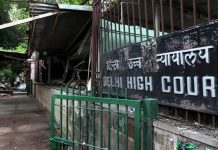This article is authored by Akash Krishnan, a law student from ICFAI Law School, Hyderabad. It discusses in detail the need for the establishment of a High Court in Puducherry and the steps taken by the Legislature and the former Chief Minister of Puducherry in this regard.
Table of Contents
Introduction
Among the several noble objectives that were sought to be achieved by the Constitution of India, one of the most important objectives was to assure social, economic and political justice for all citizens of the country.
The judiciary in a country is entrusted with the role of interpreting and applying the law in an efficient manner so as to secure the objectives provided under the Preamble of the Constitution. The courts are empowered to adjudicate disputes between individual citizens, individuals and states and between two states as well. It is their responsibility to ensure rule of law in the country. Also, the courts have been given the additional responsibility of protecting and enforcing the fundamental rights of the citizens of the country.
Before we delve into the issues surrounding the establishment of High Courts in Puducherry, let us try and understand the provisions surrounding this issue.
State judiciary
The State judiciary encompasses within its ambit a High Court and several subordinate courts. According to the judicial hierarchy of courts, the Supreme Court is the apex court of the country and the High Courts are the top courts of individual states. The first High Courts in the country were formed in the British regime under the Indian High Courts Act, 1861. Initially, three High Courts were established under this Act, i.e., the Calcutta, Bombay and Madras High Courts and the other High Courts were established with time post-independence.
Jurisdiction of High Courts
The High Courts enjoy different jurisdictions and the same has been enumerated below:
| Provision | The jurisdiction conferred on the High Court |
| Article 225 | Original jurisdiction of High Courts w.r.t revenue, admiralty, probate, matrimonial, contempt of court and election petitions. |
| Article 226 | Power to issue writs: The High Courts are empowered to issue all five forms of writs for the enforcement of fundamental rights or any other purpose. |
| Article 227 | Supervisory jurisdiction over all the subordinate courts under its jurisdiction |
High Courts for Union territories
Article 214 of the Constitution of India states that each State should have a High Court. Under Article 230, the Parliament has been given the power to make laws for extending the jurisdiction of High Courts to Union territories or to exclude jurisdictions of certain High Courts from any Union territory. Also, Article 241 of the Constitution confers the power on the Parliament to establish a High Court for Union territories. The power under Article 230 comes into life through Article 231 of the Constitution which states that a common High Court can be established for:
- Two or more states.
- Two or more states and a union territory.
Some of the examples of the application of Article 231 have been enumerated below:
| High Court | Jurisdiction | |
| State | Union Territory | |
| High Court of Bombay | Maharashtra & Goa | Daman & Diu |
| High Court of Calcutta | West Bengal | Andaman & Nicobar Islands |
| High Court of Punjab | Punjab & Haryana | Chandigarh |
| High Court of Gauhati | Assam, Nagaland, Mizoram and Arunachal Pradesh | |
| Madras High Court | Tamil Nadu | Puducherry |
The Union Territory of Puducherry
Special provisions have been enacted under the Constitution for the administration of the Union territory of Puducherry.
Article 239A of the Constitution empowers the Parliament to make laws for the creation of a Legislature for the Union Territory of Puducherry. This Legislature consists of members who are either elected or partly elected and partly nominated. Additionally, the Parliament can create a Council of Ministers for ensuring proper functioning of the Union Territory of Puducherry. When it comes to Ordinance making powers, the Administrator of the Union territory of Puducherry is empowered to issue ordinances when the Legislature is not in session. This power is similar to the power of the Governor to issue an ordinance.
Puducherry became a part of India in the year 1962. The Parliament in the exercise of the powers under Articles 230 and 231 extended the jurisdiction of the Madras High Court to the Union Territory of Puducherry. However, no steps have been taken to establish a separate High Court for the Union territory of Puducherry under Article 241 of the Constitution to date.
The call for a separate High Court
Arguments for the establishment of a High Court in the Union Territory of Puducherry
High case disposal rate of the lower courts of the Union Territory of Puducherry
The lower courts in the Union Territory of Puducherry disposed of 33,899 cases in 2014, 32,479 cases in 2015 and 28,631cases in 2016. On the other hand, only 9031 cases were disposed of by the High Courts of Tripura, Manipur, Meghalaya and Sikkim put together in 2016. The number of cases disposed of by the lower courts of the Union Territory of Puducherry in 2016 is almost thrice the number of cases disposed of by the aforesaid High Courts.
Lack of appeals for the decisions of the lower courts
Out of the huge number of cases that were being disposed of by the lower courts of the Union Territory of Puducherry, only a few were appealed against. This disparity in numbers was attributed to the extra effort involved in travelling to a different state for filing an appeal, engaging a legal counsel there etc, due to which there is a significant increase in the legal expenses suffered by the litigants.
Expenditure of the High Court
According to Article 229 of the Constitution, the administrative expenses of a High Court should be met from the Consolidated Fund of the State where the High Court is situated. According to Article 231 of the Constitution, when a common High Court is established for a State and a Union territory, the administrative expenses have to be borne from the Consolidated Fund of the State where the principal Bench of the High Court is situated. However, the Union territory of Puducherry bears a substantial portion of the administrative expenses of the High Court of Madras. This is in breach of Article 231 of the Constitution.
The call for statehood
Seven Union territories were covered under the ambit of Article 239A at the time of its enactment. Over time, six out of the seven Union territories, i.e., all Union territories except Puducherry were taken out of its ambit. Out of the six Union territories, multiple Union territories had High Court benches at the time they achieved statehood. For example, before the UT’s of Tripura, Meghalaya and Manipur achieved statehood, the Gauhati High Court had benches in these UT’s.
Thus, it is believed that the setting up of a High Court in the Union Territory of Puducherry would aid in the attempt of Puducherry to achieve statehood.
Recommendations of the All India Bar Association
In April 2017, a delegation led by the Chairman of the All India Bar Association (AIBA) Adish C Aggarwala looked into the need for the establishment of a separate High Court for the Union Territory of Puducherry for the first time. The reasons cited by this delegation for the establishment of the Union territory of Puducherry were as follows:
- The lower courts in the Union territory of Puducherry disposed of 33,899 cases in 2014, 32,479 cases in 2015 and 28,631cases in 2016.
- Only 9031 cases were disposed of by the High Courts of Tripura, Manipur, Meghalaya and Sikkim put together in 2016.
- The number of cases disposed of by the lower courts of the Union Territory of Puducherry in 2016 is almost thrice the number of cases disposed of by the aforesaid High Courts.
In light of the above statistics, the delegation of the AIBA stated that access to justice is one of the fundamental rights guaranteed under the Constitution of India. Out of the huge number of cases that were being disposed of by the lower courts of Union territory of Puducherry, only a few were appealed against. This disparity in numbers was attributed to the extra effort involved in travelling to a different state for filing an appeal due to which there is a significant increase in the legal expenses suffered by the litigants.
The delegation while briefing the former Chief Minister of the Union Territory of Puducherry, i.e., Mr. V. Narayanaswamy on the situation, made the following recommendations:
- A resolution should be drafted and adopted in the legislative assembly for the establishment of a High Court in the Union Territory of Puducherry and it should be forwarded to the Parliament and the President so that they can understand the urgency of the matter and act accordingly.
- The Chief Minister should convene an all-party meeting to discuss the idea of the resolution.
- Once the resolution is passed, the Chief Minister and an all-party delegation must approach the President, the Chief Justice of India, the Prime Minister and the Union Law Minister and express the urgency of the matter and the need for the establishment of a High Court in the Union Territory of Puducherry.
- A special task force should be formed to discuss and take steps towards the establishment of a High Court in the Union Territory of Puducherry. The members of this task force should include representatives from the Government, opposition parties, business communities, activists etc.
Passing of the Resolution
After receiving the recommendations from the AIBA, The legislative assembly of the Union territory of Puducherry passed a Resolution in April 2017 for the establishment of a High Court in the Union Territory of Puducherry. The High Court of Madras was informed of the same in July 2017.
High Court Bench in Puducherry
The Chief Minister of the Union Territory of Puducherry, Mr. V. Narayanaswamy called for the establishment of a Bench of the High Court of Madras at Puducherry during the State-level conference on legal services and motor accident mediation cells in Tamil Nadu and Puducherry. This came in August 2019, i.e., two years after the resolution was passed by the Puducherry Legislature.
The Chief Minister further stated that he had spoken to the former Union Law Minister, Ravi Shankar Prasad in this regard and had received a positive response regarding the same. He also stated that he was attempting to seek the support of Supreme Court Judges to further the cause.
Conclusion
A process that started in 2017 has not achieved anything to date. Already 4 years have passed since the Resolution was adopted by the Puducherry Legislature and attempts were made from time to time to achieve the objective proposed by the Resolution, but all these attempts are in vain as of now.
There has been no action initiated by the Central Government or the Madras High Court for the establishment of a separate High Court or a Bench of the High Court Madras in the Union Territory of Puducherry. Only time will tell whether the call for a High Court in the Union territory of Puducherry that was led by the former Chief Minister sees the light of the day.
References
- https://www.thehindu.com/news/cities/puducherry/cm-seeks-high-court-bench-in-puducherry/article28985522.ece
- https://www.thehindu.com/opinion/op-ed/set-up-a-high-court-for-puducherry/article32165647.ece
- https://timesofindia.indiatimes.com/city/puducherry/puducherry-eligible-to-have-a-separate-high-court-bar-association/articleshow/58069991.cms
Students of Lawsikho courses regularly produce writing assignments and work on practical exercises as a part of their coursework and develop themselves in real-life practical skills.
LawSikho has created a telegram group for exchanging legal knowledge, referrals, and various opportunities. You can click on this link and join:
https://t.me/joinchat/J_0YrBa4IBSHdpuTfQO_sA
Follow us on Instagram and subscribe to our YouTube channel for more amazing legal content.
 Serato DJ Crack 2025Serato DJ PRO Crack
Serato DJ Crack 2025Serato DJ PRO Crack











 Allow notifications
Allow notifications


